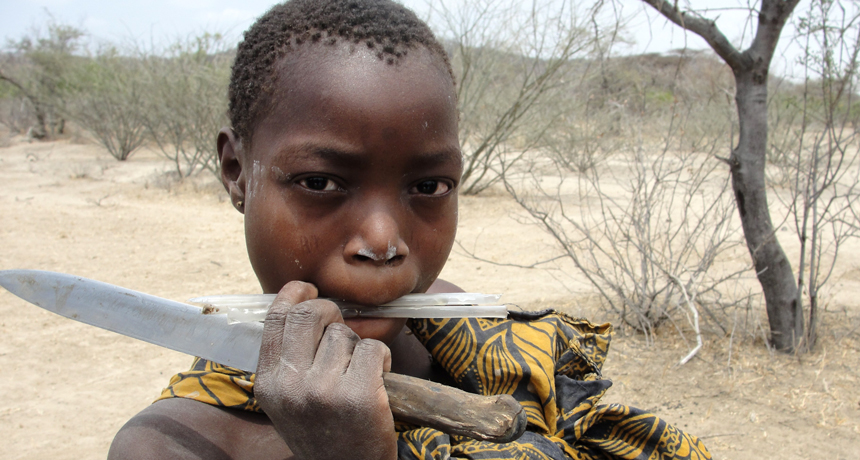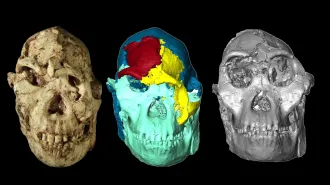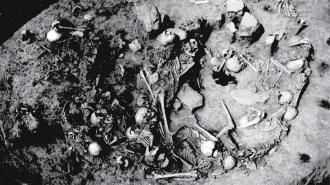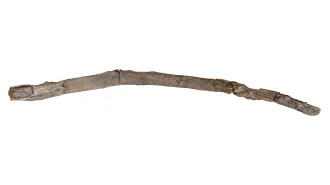The way hunter-gatherers share food shows how cooperation evolved
As the Hadza move between camps, group rules trump individual selfishness or generosity

SWEET SHARE In a series of experiments, Hadza hunter-gatherers contributed honey-filled straws to a common pot based on shifting group norms, not personal preferences. Here, a Hadza woman has just finished eating honey from her straws.
Eduardo Azevedo
East African Hadza hunter-gatherers are neither generous nor stingy. But the groups they live in are. That pattern highlights a flexible and underappreciated form of cooperation that may have helped humans go from mobile bands to industrialized states, researchers say.
Some camps share food more than others, but Hadza circulate among all camps rather than clustering in the most cooperative ones. Hadza individuals adjust their willingness to share food to the accepted standards, or social norms, of whatever temporary camp they live in, researchers report online September 20 in Current Biology.
Social norms develop in poorly understood ways. But factors such as the presence of prolific hunters probably encourage sharing in Hadza camps, says a team led by psychologists Coren Apicella and Kristopher Smith of the University of Pennsylvania. In groups with such norms, cooperators interact only with cooperators and don’t get taken advantage of by those who contribute no food, the researchers say.
Group-driven sharing among the Hadza challenges traditional theories of how cooperation evolved. Many researchers have assumed that individuals are consistently generous or selfish. In that case, cooperators seek out other cooperators, but have to guard against being exploited by sneaky, selfish hangers-on.
But “when sharing is driven by local group norms and behavior, that’s exactly what you need for cooperation to evolve,” Apicella says. Cooperative norms may have enabled Stone Age humans to knit together larger and larger groups of biologically unrelated people into modern societies (SN: 4/9/11, p. 13).
Hunter-gatherers such as the Hadza represent the lifestyles of ancient people better than anyone else today does, says Harvard University anthropologist Joseph Henrich. Apicella’s findings raise the possibility that cooperation increasingly flourished as hunter-gatherer camps with more cooperative norms survived longer than camps with less cooperative norms, Henrich suggests.
In the new study, Hadza adults played a cooperation game that mimicked one of their real-life activities — divvying up honey collected from bees’ nests (SN: 8/20/16, p. 10). Participants consisted of 383 individuals from 56 camps. About 30 people on average lived in each camp. Testing occurred four times between 2010 and 2016, with 137 individuals playing the game on two or more occasions.
Each volunteer received four honey-filled straws, and could contribute any number of them or none at all to a camp pool. Players knew the researchers would triple the total number of straws in the pool and then distribute them equally among participants.
People kept any straws they didn’t contribute, so individuals reaped the most honey by giving nothing and taking a share of the camp pool as well. The camp as a whole collected the most honey if everyone put all four of their straws in the common pot.
Hadza camps displayed similar contribution levels, whether large or small, in each of the four tests. Participants who moved from one camp to another made contributions close to the average for individuals in that camp. Individuals who switched camps thus tended to follow their new camps’ sharing norms, rather than sticking to a personal affinity for generosity or stinginess.
Apicella’s results make sense in light of findings among Agta hunter-gatherers in the Philippines, says evolutionary anthropologist Daniel Smith of the University of Bristol in England. Cooperation levels vary greatly from one Agta camp to another, he and his colleagues have found.
Agta tended to share experimental tokens redeemable for rice with camp mates who were least cooperative in an experimental sharing game, Smith’s team reports online August 16 in Evolution and Human Behavior. Uncooperative players typically were old, pregnant, unable to work or otherwise in special need of food, suggesting that Agta make a point of giving food to their neediest camp mates, Smith says.






